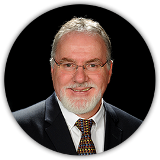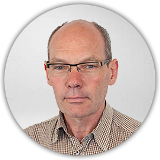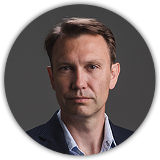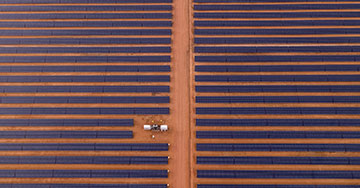
Rethinking power grids
The path to a sustainable future for power generation in the Middle East
In this webcast, Louis Strydom, Senior Manager Project Development at Wärtsilä Energy Business, talks to three thought-leaders from Mott MacDonald about the future of power systems in the Middle East. Guy Doyle, Chief Economist for Energy, Paul Tuson, Technical Lead for Transmission & Distribution and Christian Kaufmann, Senior Consultant for Energy Strategy and Innovation, share their thoughts on how energy producers can reap the sustainability and cost benefits of variable renewable energy (VRE).
An era of change for the power sector
“A short while ago the incentive for migrating from conventional generation to renewables may have been environmental, but more recently the incorporation of renewables leads to least-cost dispatch decisions,” explains Tuson. “Only six years ago few people took renewable energy very seriously,” agrees Kaufmann. “Now most are looking to increase their use of renewables, to the extent we’re moving even closer to looking at 100% renewable systems. This has been driven by the ever-reducing cost of renewable energy, but there are also other game-changers that have really unlocked the potential for a fully renewable future, such as low-cost large-scale battery storage, demand side response, smart grid technology, and ever more sophisticated planning, forecasting and scheduling tools.”
Local opportunities for decarbonisation
The Middle East has been a major player in global energy markets based on its oil resources. While the push for renewable energy had put the region’s success in doubt, it is now becoming clear that the Middle East is primed to remain a global energy player thanks to its favourable geography for low-cost renewable energy: a fantastic solar resource, vast areas of cheap land and, in some places, on and off-shore wind resources.
There will also be challenges, warns Tuson: “Most systems that successfully rely predominantly on renewable energy do so by having access to geothermal, biomass and hydro generation, but these resources are not available in the Middle East, or only to a limited extent. This is important because they are synchronous renewable generation sources, which our power systems have come to rely on. In contrast, all the resources available cheaply at scale in the Middle East are non-synchronous or inverter-based, with the exception of concentrated solar power.”
Kaufmann agrees, but points out the economics present a strong argument. “The cheapest source of energy available today is renewable and it is in the Middle East. Almost every new large-scale solar PV project achieves a new lowest cost record. At the same time, solar generation profiles match the demand profile in hot climates where load demand is significantly driven by cooling requirements, which also means fewer issues around storage requirements faced in other areas.”
Overcoming the challenge of grid stability
Large amounts of non-synchronous renewable energy generation can decrease overall grid stability, so to increase the share of VRE this challenge must be overcome. “With appropriate mitigation measures, such as synchronous condensers, VRE shares of 80–90% could be absorbed by power systems using current technologies and control systems,” explains Tuson. “Achieving 100% renewable energy currently requires a reliance on a significant amount of generation from synchronous renewable resources, such as biomass, hydropower, geothermal or waste from energy. If we are talking about systems that fully rely on solar and wind, then this presents a bigger challenge. In principle, it should be possible to use grid forming inverters rather than conventional load-following inverters, as these provide the reference frequency and voltage source for the system.”
“As an economist, I see the challenges from a slightly different angle,” says Doyle. “What we see a lot is that market or regulatory regimes are not set up to deliver the technical solutions that are required to make this happen.”
“In my role as a modeller, I see that people think too simplistically about energy systems and they don’t really take a data-driven approach to quantifying the challenges and the value that can be unlocked,” adds Kaufmann. “If you don’t quantify the impacts, costs and outcomes accurately you will get lost in complexity. The key challenges for me relate to the very short-term balancing needs arising from the intermittency of renewables, but also long-term energy balancing, particularly the need to have back-up generation or long-duration storage available to cover periods when renewable output is low. Very high renewable penetration systems can seem to be the least-cost path, but if you are missing key ingredients you will get stuck with a plan that may make the last 10–20% of decarbonisation prohibitively expensive.”
Unlocking the economic opportunities of sustainability
Decarbonisation, if done right, brings huge economic opportunities that should be taken into account when considering the cost of overcoming the challenges that come with it. “In a future where VRE will drive sustainable least-cost electricity, your system’s centre of gravity becomes non-synchronous. This means you must be agile in your grid planning and operations, using net load balancing to produce power both effectively and efficiently, with digitalisation and decentralisation as the keys to success,” concludes Strydom. To find more key takeaways about how best to rethink power grids, watch the webcast in full above.
Presented by

Paul Tuson
Systems Studies Team Leader - Chief Electrical Engineer
Mott MacDonald

Christian Kaufmann
Senior Energy Strategy and Innovation Consultant
Mott MacDonald

Guy Doyle
Chief Economist, Energy
Mott MacDonald

Louis Strydom
Senior Manager Project Development
Wärtsilä Energy Business
Check out other episodes
Episode 2

Rethinking energy storage systems
What changes are needed to boost the deployment of energy storage in the Gulf? Who should invest in these assets, and what are the best use cases? Listen to experts from AFRY, ENGIE and Wärtsilä discuss the current status, potential use and market development for energy storage systems in the Middle East.
Episode 3

Rethinking tomorrow’s generation portfolio
AGL Energy is the largest energy producer in the Australian market. What are their experiences and insights on the journey towards decarbonisation? How have they had to rethink its business model in the changing energy landscape? Listen to experts from AGL and Wärtsilä discuss about tomorrow’s generation portfolio and the transition to renewable energy.